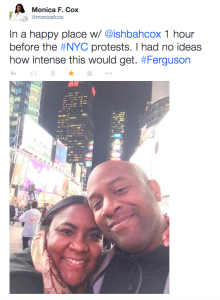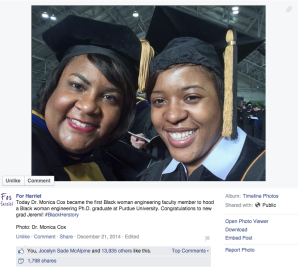Blog
Believe It or Not, Everyone’s Not Going to Become a Pioneer
Yes, I said it. Everyone is not going to be a pioneer. What a negative thought. I can hear someone read this and say with a huff, “How elitist! How can you say this about anyone? Who are YOU to be a member of the leadership police? How can you determine whether someone can or cannot be a trailblazing leader or pioneer?”
Last week I discussed my Prepared to Be a Pioneer™services with a friend. As I presented my business model to her, she said something amazingly profound- “If everyone could be a pioneer, then being a pioneer wouldn’t mean much.” Her statement hit me like a ton of bricks.
I began to think more deeply about what it means to be a pioneer. According to the Merriam-Webster dictionary, a pioneer is
(1) A person or group that originates or helps open up a new line of thought or activity or a new method or technical development, or
(2) One of the first to settle in a territory
This means that pioneers are the originators, the first ones, or the people who are creating and leading new efforts.

I also thought about the people I know. For better or for worse, many of them are followers. They want someone else to take that first step, to call out injustices, or to initiate interactions with opposers. Many of them know that pioneers are the ones who are going to be the first casualties- the ones who will be labeled or blamed if something goes wrong and the ones who may be blackballed forever because of their views and perspectives.
Although being a pioneer can be difficult, there is a positive aspect of pioneerism. Via their leadership, pioneers can change political systems, can cure (seemingly) incurable diseases, and can present ideas in ways that no one ever imagined up to that point in time. Past and current pioneers often are not motivated by the fame that will accompany their accomplishments. Their passion for their work and for their purpose are so great that they transform how people view their achievements and themselves. What pioneers do and how they do it will outlast their mortal bodies. Yes, those are pioneers.
Now, back to my business. My services are targeted to people who are courageous and who want to change the world as we know it. (Meet Ashley G. Scott to see how I’m already achieving this!) This aspiration does not come without a cost, however. I am here to guide future pioneers when they speak their truths or are attacked for believing what they believe. I am here to encourage them when they think that they have no fight left in them to accomplish goals that no one has accomplished to date.
I am here to help others to become pioneers, because this is my calling. My entire life has been made up of firsts. For this reason, I am no longer afraid to start something new. I want others to know that they should not be afraid either. After all, being a pioneer is a lifestyle. If a dream has been planted in your spirit, then that dream should become a reality. There is nothing wrong with being an originator, because it is only by stepping out in faith that others might later have the courage to follow you.
———
If you enjoyed my post, feel free to share it with others. Also check out my other blog posts, and provide your contact information so that we can stay connected. Like me on Facebook, and follow me on Twitter, Instagram, and Pinterest.
5 Secrets to Rocking Social Media Like a Celebrity
During my five month sabbatical, I was mentored by social media entrepreneur. During these months, I’ve observed almost all of his social media interactions, critiqued as many of his social media posts as possible, and read the interactions written by his adoring fans. In a little over a year, I have grown my Twitter followers from 250 to almost 2500 people. Of course, this is a long way from his 110,000 Twitter followers and his 120,000 Facebook followers, but I am slowly but surely on my way to becoming a public intellectual like astrophysicist Neil deGrasse Tyson!
As a professor, I never thought about engaging extensively with people outside of the academy, especially virtually. My primary method for disseminating information to date has been in journals or at disciplinary conferences. This means that my research findings are most likely to reach those who possess Ph.D.s or have access to the wealth of knowledge found in college classrooms and libraries.
Although I love adding to the body of knowledge in my field and being a professor in the academy, I realized almost a year ago that I was overlooking a group of people who I might never meet on my college campus (i.e., people who live in remote areas or those who have no interest conversing with a Ph.D. holder, a professor, or an engineer). To accomplish my research dissemination and STEM advocacy goals, I decided to step up my social media game. These efforts have resulted in new opportunities and in my connection to communities that I might never find in my Indiana community.

Below are some of the biggest lessons that I’ve learned about social media. Although I can’t guarantee that these tips will garner you a verified Twitter account (look it up!), I can guarantee that these tips are some of the best ones that you will get for free.
(1) Make people want to be you or do what you do.
Yes, this sounds vain and absolutely terrible, but it works. People often want what they don’t have, and they love to live vicariously through others (think self-efficacy theory). If you don’t believe me, look at the number of people watching The Real Housewives of Atlanta or Keeping Up with the Kardashians. Many people sit on the edges of their seats measuring how similar or how different their lives are to those who are labeled celebrities.
Where we get this wrong in science, technology, engineering, or mathematics (STEM) fields is that we present bland facts to the public, or we don’t present anything at all. Remember, a picture of a beaker by itself isn’t sexy, so please don’t put one up when you talk about your research. Also, don’t display a picture of yourself looking tired and crazy. Yes, STEM fields can be difficult, and yes, you may have been working in your lab for 20 hours, BUT we don’t have to look as if we’ve been tortured in our social media posts. Present your most appealing and intriguing self to others, and watch what happens!
(2) Create relatable content.
Although professionals can post links to their research articles or can post pictures at conferences, every post does not have to be professional. Consider starting a blog that presents more than one dimension of your life. If you are married, this might be a picture of you and your partner. If you enjoy outdoor activities, tweet a photo of you before your next half-marathon. Express language about how you are feeling or about your vulnerabilities at that moment (e.g., being nervous or excited). Regardless of how you present this personal content, post something that shows that you are a living, breathing human who experiences positive (and sometimes) negative emotions.

(3) Post consistently.
Like any new practice, consistently posting on social media takes time. Instead of staying glued to your computer or mobile phone or posting on social media during faculty meetings (!), consider using social media management tools such as Hootsuite or Buffer to post at least 5 times a day on Twitter and a minimum of once a day on other social media platforms (e.g., Facebook, Instagram, or LinkedIn). It only takes a few minutes per week to schedule your social media posts across multiple social media sites. This, plus the addition of a Hootsuite or Buffer extension in your browser or an app on your mobile phone, gives you the freedom to read an article and share it immediately with your followers.
(4) Interact with Others.
It’s called social media, not “stalk other people without interacting with them” media. I can’t tell you how many people open social media accounts just to read what everyone else is saying or to catch up on a person’s gossip. If I’m referring to you, STOP being a social media voyeur, and START getting some action. There are so many fascinating, funny, smart people who want to engage in conversations with you.
For Twitter (my favorite social media platform), start by asking questions or by answering questions that others post. If someone contacts you, find ways to engage with that person. Follow general rules of conversation and morality in your interactions (e.g., If you’re single, flirt. If you’re married, don’t.)
Via social media, I’ve “talked” to singer Marsha Ambrosius (Instagram) and been followed by attorney Judy Smith, the “real” Olivia Pope (Twitter)(Side note: At the time of this post, I’m one of her 608 followers!). Since the President of the U.S., university presidents, and almost anyone you can think of is on social media, there is no telling who can learn about your business, research, or most intimate thoughts. Maybe social media will even promote world peace! (Yeah, I’m spreading it on a little thick, but you get my point.)
Believe me when I say that professionals, particularly those in academia, are missing big, humongous opportunities to network when they only choose to network in face-to-face venues. I predict that over the next 20 years, networking as we know it will take place primarily via social media. Why not learn how to do this sooner than later?
(5) Tell a good story.
I love the storytelling aspect of social media. Instead of creating a series of disconnected posts, think about how your posts tell a story about who you are and who you want to be.
For example, I enjoy telling my academic stories to others. I have been a professor for 9 years. My social media family has met my Ph.D. students and my husband. They know that I like to laugh, and they know the values that I hold dear. The story that I want to tell via social media is that I’m a humorous, intelligent woman who is approachable and passionate about STEM. My social media story reflects this.

In conclusion, some people think that I reveal too much via social media. I have decided, however, that in this one life that I’ve been given, my electronic tattoo is going to tell people 200 years from now who I was and how I made a difference in the world. What about you?
BONUS TIP: Determine how much you want to reveal about yourself and who you want to be via social media. One of the gurus of social media is Gary Vaynerchuk. Whether you’re a social media novice or expert, watch any of his engaging videos, and you will be convinced of the power of social media. I love his message so much that I’ve adapted it for an undergraduate e-portfolio course in the Engineering Leadership Minor at Purdue!
—————
If you enjoyed my post, feel free to share it with others. Also check out my other blog posts, and provide your contact information so that we can stay connected. Like me on Facebook, and follow me on Twitter, Instagram, and Pinterest.
5 Things Kermit the Frog Can Teach Us about Life
My favorite meme of 2014 was Kermit the Frog. Those closest to me know that I will turn ANYTHING into a Kermit meme. Say something crazy, and I will pick up my imaginary cup of Lipton tea to say that the craziness is none of my business. My husband, a comedian in his own right, even joins in on the fun by occasionally pursing his lips and transforming his cups of coffee into “Kermit tea.” Of course, we laugh uncontrollably at our Kermit antics. Although I joke about Kermit a lot, professionals can learn much from Kermit the Frog and his memes. In true Monica Cox fashion, allow me to share my top 5 Kermit lessons with you.
(1) Keep it simple.
Kermit doesn’t drink Tazo, Bigelow, Teavana, or Argo tea. He sticks to the simplest brand of all- Lipton. With his precise portion of black tea in a tea bag labeled “Lipton,” he’s not ashamed to let everyone know that he is not a pretentious frog. He sticks to what he likes, and he’s not afraid to display his real self and his simple tea tastes to the world.
(2) Speak your truth.
Kermit’s words are sharper than a knife. The minute you read his words, you want to say “oooohhhh” and shrink like a violet at the sharpness with which someone got cut by his statement. In the end, Kermit says what needs to be said and often speaks what no one is willing to say out loud. No stuttering, blinking, or apologies are needed.
(3) Take breaks.
Kermit is sober when he says what needs to be said, and his words are not hidden behind the guise of alcohol. This takes great courage. After he speaks his truth, however, he takes a break. This means that if and when someone wants to challenge his words, they can talk to him AFTER he drinks his brew.
(4) Know when to shut up.
Kermit’s signature phrase is, “But that’s none of my business.” Like an old Southern church lady, Kermit says what he wants to say and then has nothing more to say about it. In his own way, Kermit lets you know that he is no longer engaged in the conversation. The case is closed. Move on to the next topic.
(5) Know a little about everything.
Kermit is a cosmopolitan frog. Whether the topic is ebola, dating, or money, Kermit has a point of view. This means that he can stand before both commoners and kings to speak his truth.
In sum, we could learn much from Kermit. He keeps it real, yet knows how to party. At the end of the day, however, he’s a frog who deliberately engages with those around him. We should do the same.
——-
If you enjoyed my post, feel free to share it with others. Also check out my other blog posts, and provide your contact information so that we can stay connected. Like me on Facebook, and follow me on Twitter, Instagram, and Pinterest.
Professional Lessons Courtesy of Empire’s Lyon Family
Move aside, Tyler Perry! Lee Daniels and the cast of Fox’s Empire are the hottest things on TV. The acting, the music, and the drama are the black, adult version of Glee. In an age where there are so many negative images of black men, Empire introduces the world to men who epitomize power- the mogul (Lucious), the professional (Andre), the pretty boy (Jamal), and the rebel (Hakeem). Top that off with Mama Cookie, a woman who doesn’t bite her tongue, and you have a spicy recipe for success!
As I watched the first few episodes of Empire, I wondered why higher education isn’t sexy like the music industry or Hollywood. Where’s the behind-the-scenes Timbaland dropping sick beats that make you want to leave your six figure job to intern (for free) at a record label? What would happen if I walked in my engineering classroom wearing a jet black, waist-length wavy weave and a pair of 4 inch animal print stilettos? Could I maintain my credibility as a professor while still displaying fierce personality and style?
Although higher education isn’t quite ready for the “ratchet” behaviors that are somewhat commonplace in Empire, there are lessons to be learned from the Lyon family. “The Dr. Monica Cox” (as my former assistant’s daughter calls me), the professor who overanalyzes everything related to pop culture and life, is breaking down what to do in higher education or any other profession when you meet people who possess the characteristics of America’s newest sweethearts, the Lyons.
Lucious- The Traditionalist
WHO HE IS
Lucious put his hand to the plough to build his musical empire. One who doesn’t believe in handouts, he attended and graduated from the School of Hard Knocks. Since it worked for him, he thinks that it should work for others too.
PROFESSIONAL APPLICATION
The Traditionalist wants things done the way that they’ve also been done. If there is a process in place to get a result, he thinks that this process must be followed to guarantee success. He must remain in control at all times. If you have to work with him, it’s best to understand your true identify before your interactions. Be steadfast, and do not let him discourage you, since he has a viewpoint that might not change. Although The Traditionalist may not see your dreams or potential at first, never forget that your dreams are valid.
Andre- The Schemer
WHO HE IS
Andre is insecure. Instead of believing in himself and gaining success based on his own merit, he feels the need to sabotage his brothers to acquire a position that he wants. His constant need to scheme and to manipulate keeps him in a continuous state of unrest.
PROFESSIONAL APPLICATION
The Schemer is the person who often says one thing and does another. Instead of trying to rationalize why he is the way that he is, use your energy to create strategies that help you to stay positive. You can only control your actions, not his. Use wisdom in your dealings with The Schemer, and make sure that you do not stoop to his level during your exchanges with him.
Jamal- The Impostor
WHO HE IS
Jamal is a great talent. He has been knocked down by life and by those around him so much that he doesn’t walk in his absolute awesomeness. Embodying the Impostor Phenomenon, Jamal stands out in a crowd. No matter how many times others compliment his greatness, his insecurities remain.
PROFESSIONAL APPLICATION
Jamal harms himself much more than he harms others. Since The Impostor does not have the confidence that he needs, he has to be assured of his abilities constantly. This can be frustrating for leaders or team members who do not have the time or the patience to remind The Impostor how much value he adds to the world. Since The Impostor is often a valuable member of a team, leaders should offer him constructive feedback that reinforces his skills while encouraging him to be more confident in his abilities.
Hakeem- The Delinquent
WHO HE IS
Hakeem has to learn lessons the hard way. People tell him about ways to avoid trouble, but he ends up figuring things out by trial-and-error. Constantly showing up with bumps and bruises, he is a curious cat who acts before he thinks fully about the consequences of his actions.
PROFESSIONAL APPLICATION
Hakeem is the person who is going to do what he wants to do. You can create processes and plans, yet he will do it his own way. If you supervise someone like Hakeem, you have to know that he is a loose cannon. He answers to no one. Unless you become comfortable with the fact that you might always be uncomfortable, The Delinquent has the potential to subtract years from your life. If you are a collaborator with The Delinquent, stay on your toes and cover your tail.
Cookie- The Avenger
WHO SHE IS
She is the person who wants what belongs to her. Although forgiveness frees the people who forgive, Cookie doesn’t care about this principle. She will fight to get what belongs to her until no one is left standing. Bitterness is a way of life for her, and she is a tornado who will destroy everything and everyone in her path.
PROFESSIONAL APPLICATION
There is no rationalizing with The Avenger. No matter how much you explain how life might get better for her, she will not be convinced of this. This person is the consummate pessimist. When working with her, remember to end the conversation on a positive note and do not allow her to kill the morale of your team.
Although the average person’s life might not ever be as exciting as the Lyon Family’s lives, we should be thankful that we don’t have to encounter all of their personalities at once. The next time you feel the need to complain, walk to a keyboard, put on a tight t-shirt, imagine that Timbaland is your personal producer, and sing your troubles away with no apologies.
——-
If you enjoyed my post, feel free to share it with others. Also check out my other blog posts, and provide your contact information so that we can stay connected. Like me on Facebook, and follow me on Twitter, Instagram, and Pinterest.
Photos courtesy of Empire and Google Images.
Stop Caring about What People Think
My parents have told me my entire life that I shouldn’t care about what people think. When, during my K-12 school years, some of my classmates laughed at my nerdiness, my style, my accent, or anything else, my parents often told me that those individuals didn’t buy my clothes or feed me, so I should just ignore them. Although it’s easier said than done, their advice has stayed with me over the years.
The older I’ve gotten, the more applicable my parents’ advice has become. A few years ago, when I had to make tough fiscal decisions about a big project that I was working on, some of the people affiliated with the project got upset with me for changing processes and for taking more control of the day-to-day activities. They were used to doing what they had always done, but as the new leader, I had to choose whether to allocate funds the way they were supposed to be allocated or whether to look the other way as a project member used funds as she wanted (and out of project scope).
I decided to retain the integrity of the project, but not without serious conflicts arising. Up to 15 people at all levels became involved in the conflict, but at the end of the day, the integrity of the project remained, and project funds were not mismanaged. Some people might ask me if addressing this issue was worth it. I say yes, because I was the leader of the project, and if anything would have gone wrong, I could have been demoted, audited by the project funders, or imprisoned for misuse of federal dollars. This was an early professional lesson in learning not to care about what others thought.
In that same project, I had to determine whether I would allow seasoned members of the dysfunctional team to continue to engage in disruptive behaviors that were disrespectful to myself and to the project team. As the new leader of the team, I spoke out for all members of my team to ensure equity. If I had allowed the negative behaviors of a few to continue, other members of the team would have had no voice, and students who needed to have been served within our program might not have been served. Once again, I did not care about what the naysayers thought.
When you stop caring about what people think but focus on doing what’s aligned with your core values, conflict will always be near. The key to being successful, however, is knowing that everyone doesn’t need to validate you. You will ascend professionally when you own your truth and know why you do what you do regardless of what others think. There is also wisdom in knowing when to address issues and when not to address issues. A sign of maturity, however, is knowing that regardless of the outcome, you are going to be okay, you will not crumble, and you will not break for sticking to your core values in your professional exchanges.
BONUS
Here are some questions that might guide you as you decide what to address and what not to address in your professional relationships. Also read these 30 quotes that will give you courage to care less about the opinions of others.
- Why do you care about a potential conflict? Are you concerned that you will be ostracized? Ridiculed? Fired?
- Will you feel worse confronting the issue or staying silent about the issue? What are the pros and cons of doing each?
- Who are the members of your team or inner circle? If and when conflicts arise, will they be available to advise you, guide you, and stand up for you?
———-
If you enjoyed my post, feel free to share it with others. Also check out my other blog posts, and provide your contact information so that we can stay connected. Like me on Facebook, and follow me on Twitter, Instagram, and Pinterest.








